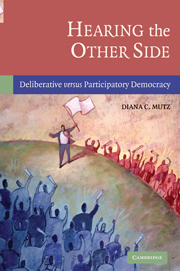1 - Hearing the Other Side, in Theory and in Practice
Published online by Cambridge University Press: 05 June 2012
Summary
When I was a child my father and I often went to the dentist together because the office was downtown, near his office, and because it was his dentist, the one he had seen since childhood, and my dad wanted very badly for me to like him. I made it clear that I had mixed feelings about the guy. Even if I could get over his name (Dr. Risk), and the fact that he insisted on calling me “Missy,” there was the fact that he was independently wealthy and practiced dentistry for fun.
But the ritual between the two of them was well established. He would put my father in the chair, stuff his mouth full of cotton, and begin to talk politics. As president of the local American Civil Liberties Union chapter, Dr. Risk and my ardently Republican father had a lot to talk about. My father could barely contain his eagerness to spit just to get a word in edgewise. For the two of them it was sport, and it was clear that my father greatly respected Dr. Risk, even if he would never take political advice from him. I know this because if I ever complained about going to the dentist, my father would nudge me with guilt: “But Dr. Risk is such a good man.” Good man or not, he was, after all, a dentist.
- Type
- Chapter
- Information
- Hearing the Other SideDeliberative versus Participatory Democracy, pp. 1 - 18Publisher: Cambridge University PressPrint publication year: 2006
- 2
- Cited by

